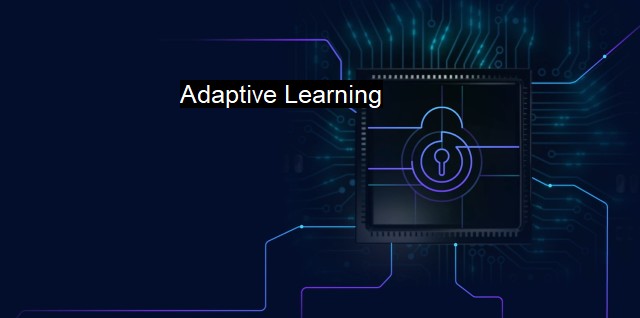What is Adaptive Learning?
The Power of Personalization: Examining Adaptive Learning in Cybersecurity and Antivirus
Adaptive learning can be defined as a process that uses technology and data to create personalized paths for students' learning. When utilizing adaptive learning approaches, the curriculum or learning experience is adjusted based on a learner's performance, capabilities, and needs. Hence, adaptive learning algorithms are tailored based on individuals' unique needs and skills, enabling a more personalized and efficient learning process.In the sphere of cybersecurity and antivirus, adaptive learning takes on new maximized importance. Crafting a robust and full-proof cybersecurity framework necessitates education and training that stays on top of ever-growing and ever-evolving threats. As new types of viruses and malware emerge, the skill sets needed to protect information networks must evolve too. Here's where adaptive learning proves to be extremely efficient.
The threat landscape in cybersecurity is constantly changing. Every day, cyber attackers generate novel, sophisticated types of malware, and no antivirus software can keep up if it solely relies on pre-existing knowledge or static databases of known threats. Thus, relying on traditional methods of recognizing malware based on pre-established patterns is quickly rendered obsolete. In relation to antivirus mechanisms, adaptive learning can provide a pioneering solution to this persisting problem.
Adaptive learning technologies enable an antivirus software to learn and adapt from every encounter with potential threats. Antivirus applications can leverage adaptive learning by continuously learning from new data—like strange actions, suspect code samples, and new types of malware. The antivirus software can then use the learned data to adapt its malware detection, promoting a more effective protection mechanism.
Adaptive learning in cybersecurity extends beyond enhancing the capabilities and flexibilities of antivirus software. For instance, it can be a significant instrument for employee training within organizations. Cybersecurity isn't solely about technology; it's also concerning people and their awareness about cyber threats. Employees need to learn to recognize and respond to threats appropriately.
Adaptive learning offers a more efficient training approach that caters to the unique learning styles and paces of individual employees. The quicker that employees understand cybersecurity concepts, the sooner they can apply their knowledge practically to secure the organization's network. In other words, an adaptive learning approach to training can help bridge the skills gap faster by offering adaptive, personalized learning experiences.
Adaptive learning contributes to cybersecurity risk management by simplifying the process of identifying potential cyber threats and attacks. It allows organizations to proactively adapt their cybersecurity strategies and plans based on observed trends, behaviors, and potential threats.
Adaptive learning in the context of cybersecurity and antivirus emphasizes not just the ability to learn, but also the capacity to adapt to changes over time. As cyber threats become more advanced, adaptive learning technologies provide the dynamic learning approach required to keep up with the changing threat landscape. More than just learning about threats as they emerge, these technologies provide the opportunity to adapt to those threats swiftly. They tailor dynamic protection that evolves alongside the threat landscape, making them a powerful tool in safeguarding our digital world.
Adaptive learning is the future of cybersecurity and antivirus. As the cyber threat landscape continues to evolve and become more complex, adaptive learning provides an unprecedented opportunity for cybersecurity professionals to stay ahead. It is undeniably one of the most influential tools shaping the landscape of cybersecurity education, antivirus software, and cyber risk management.

Adaptive Learning FAQs
What is adaptive learning in cybersecurity and antivirus?
Adaptive learning in cybersecurity and antivirus refers to a personalized learning approach where the system adapts its content and instruction to meet the unique needs and abilities of each learner.What are the benefits of adaptive learning in cybersecurity and antivirus?
The benefits of adaptive learning in cybersecurity and antivirus include improved learning outcomes, increased engagement, better retention, and enhanced performance. Adaptive learning systems can also help identify knowledge gaps and adjust instruction accordingly.How does adaptive learning work in cybersecurity and antivirus?
Adaptive learning in cybersecurity and antivirus works by using algorithms and data analytics to analyze user behavior, assess skill levels, and provide personalized instruction based on that analysis. The system continuously evaluates user performance and adjusts the content and instruction dynamically to improve learning outcomes.What are some examples of adaptive learning in cybersecurity and antivirus?
Some examples of adaptive learning in cybersecurity and antivirus include interactive simulations, gamification, scenario-based training, and personalized learning paths. These tools are designed to deliver content and instruction that adapts to the user's needs and abilities, providing a customized learning experience that maximizes engagement and retention.| | A | | | B | | | C | | | D | | | E | | | F | | | G | | | H | | | I | | | J | | | K | | | L | | | M | |
| | N | | | O | | | P | | | Q | | | R | | | S | | | T | | | U | | | V | | | W | | | X | | | Y | | | Z | |
| | 1 | | | 2 | | | 3 | | | 4 | | | 7 | | | 8 | | |||||||